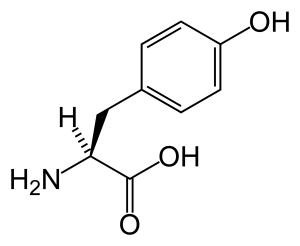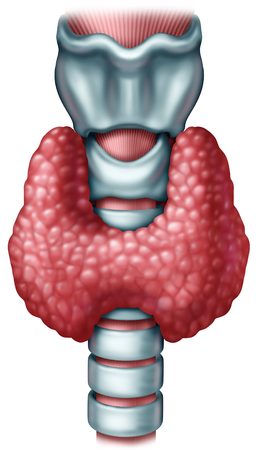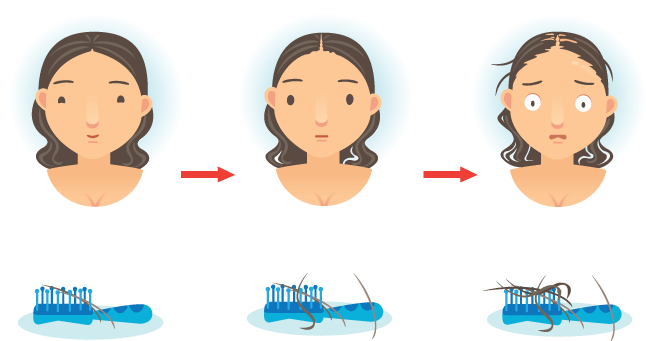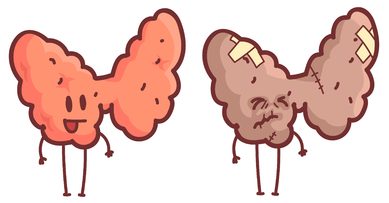
Table of Contents
Last Updated on
When one starts to think of the human body and all the activity that goes on inside each of us every day, it can make your head spin. Hormones, proteins, amino acids, thyroid, pituitary, the list goes on and on.
Unless you have had a thyroid problem or are in a medical profession you most likely have not heard of L-tyrosine.
In this article we are going to discuss what it is, how it works, benefits, the dosage and more, particularly how it interacts with the thyroid.
What is L-tyrosine?
L-tyrosine is synthetic version of the naturally occurring tyrosine, a non-essential amino acid.
The main function of amino acids is to build protein. They are also crucial in making neurotransmitters in your brain.
You may have heard of some of these brain chemicals: epinephrine, norepinephrine, and dopamine. These transmitters help to stabilize your mood and nerve cell interaction.

Skeletal structure of l-tyrosine
Non-essential does not mean unimportant.
The essential amino acids are ones we have to get through food because our bodies cannot make them.
What’s more is that bodies don’t store amino acids and so we need to get these on a regular basis. T
he non-essential amino acids are produced by our bodies through a process called transamination where an amino acid is formed from another amino acid (in this case phenylalanine).
So the label non-essential does not mean we do not need them, it means our bodies synthesize them and we do not need to get them from our diet.
If we are sick or unhealthy our bodies may not make enough of the amino acids so we will need to make sure we get it through our diet.
L-tyrosine is part of a group of amino acids called aromatic. This classification comes from the location and formation of the molecules that make up the amino acid. There are three that are closely linked: phenylalanine, tryptophan, and our focus amino acid, L-tyrosine.
Each one has been given a label that indicates how they work with the various neurotransmitters.
Phenylalanine is known as the pain reliever. Tryptophan is known as the sleep promoter. L-tyrosine is known as the anti-depressant. These nick names of sorts give us a good indication of how they are used in treatment settings.
L-tyrosine also helps to regulate a variety of hormones that are produced by the thyroid, adrenal gland, and pituitary gland.
Here’s another little fact, L-tyrosine aids in the production of melanin which is responsible for skin and hair color. Not only that, but L-tyrosine has something to do with every protein in our body…very interesting.
What is the Thyroid?

Illustration of the thyroid
The thyroid is a small gland in your throat that essentially regulates key functions in the body. It works in conjunction with the hypothalmus and pituitary gland to control such things as metabolism, temperature, breathing, reproduction, heart rate, and many other critical functions.
The thyroid basically processes iodine to make necessary hormones.
But iodine needs to be mixed with tyrosine to make triiodothyronine (T3) and thyroxine (T4) hormones.
The thyroid is the only organ in the body that can process iodine.
And since it needs tyrosine to make the T3 and T4 hormones, it is necessary to make sure your body is either making the tyrosine or getting it through the diet. The T3 and T4 hormones are sent throughout the body mainly balancing the metabolism.
The pituitary gland produces Thyroid Stimulating Hormone (TSH).
When the levels of the thyroid hormones T3 and T4 are low, the pituitary gland sends out TSH to tell the thyroid to make more T3 and T4. And the reverse is also true.
If the pituitary gland senses the levels of T3 and T4 are too high, it slows down the production of TSH.
Most folks do not have a thyroid problem, but many do.
You can have an overactive thyroid (hyperthyroid) that makes too much T3/T4 or you can have an underactive thyroid (hypothyroid) that does not make enough T3/T4. This imbalance can lead to diseases.
See the table below for a list of common symptoms of thyroid problems.
| Signs & Symptoms Your Thyroid is not Working Properly | |
| Exhaustion | Depression |
| Anxiety | Taste buds seem “off” |
| Difficulty concentrating/forgetfulness | Low libido |
| Heart flutters/palpitations | Dry, itchy skin |
| Unpredictable bowels | Irregular menstrual cycles |
| Unexplained pain in extremities | Elevated blood pressure (hypertension) |
| Fluctuating body temperatures | Hoarse voice; funny feeling in neck |
| Disrupted sleep schedule | Sudden weight gain or loss |
| Thinning hair | |

Hair loss is one of the most common symptoms
So, you can see the thyroid affects quite a few areas of the body.
There are many things that can set off a reaction in your thyroid that will affect how it is running. Things such as genetics, autoimmune attack, pregnancy, nutritional deficits, stress, or environmental toxins can all play a part in affecting the thyroid so it is not functioning at the right levels.
Effects/Mechanism
This is where the L-tyrosine comes in. This amino acid helps the thyroid to operate at optimum levels.
The body makes tyrosine from another amino acid, phenylalanine.
The tyrosine then makes the proteins and a handful of brain chemicals that we all need to function. Some studies have shown that l-tyrosine directly affects the brain because of the neurotransmitters it synthesizes.
Often referred to as stress hormones, epinephrine and norepinephrine are made by chemical interactions utilizing L-tyrosine. These stress hormones help the body react to certain stresses and gives the body the ability to handle stress in a more positive way.
As stated earlier, the thyroid is very critical to many functions in the body. The interactions with a variety of substances, including foods, can really wreak havoc on the body. The first line of defense is to have your thyroid tested. Once you have a diagnosis, follow doctors’ directions closely to maintain healthy levels of tyrosine, T3/T4 hormones, amino acids, proteins and more.
Symptoms Associated with L-tyrosine Deficiency
When the various amino acids, proteins, hormones are out of sync there are a variety of diseases and symptoms that may appear.
We will look at some of the important conditions that need tyrosine as a remedy.
It has been shown that high levels of stress deplete the levels of tyrosine so it may be important to help increase levels of L-tyrosine through the diet or via supplements.
There are a variety of symptoms associated with an L-tyrosine deficiency.
One of the most common is difficulty losing weight. If you remember in the section above, hypothyroidism reduces the metabolism so it will be difficult to lose weight. A hypothyroid is an underactive thyroid; unfortunately, blood tests are not precise in detecting hypothyroid, so many times it goes undiagnosed.
A hypothyroid reduces the body temperature which in turn reduces the metabolism. Studies have shown the metabolism can be reduced as much as 24%. A hypothyroid cannot regulate sugar; this fact then leads to other issues such as diabetes – all this from one tiny organ.
In converse, a hyperthyroid is overactive. Some causes of a hyperthyroid can be disease such as Grave’s disease, too much iodine, and inflamed thyroid.
L-tyrosine is not recommended for aiding a hyperthyroid, in fact, L-tyrosine may be detrimental because increased levels of L-tyrosine would also increase levels of thyroxin making the condition much worse.
Phenylketonuria (PKU) is the inability to process phenylalanine properly and therefore the thyroid does not make the necessary L-tyrosine.
People with this disorder must avoid phenylalanine in their diets and add L-tyrosine in order to have this amino acid on hand to help with the building of proteins and the neurotransmitters.
L-tyrosine Benefits
There are many benefits of L-tyrosine that can help folks with various problems or symptoms as discussed above. In addition, we mentioned earlier that L-tyrosine has many benefits because in interacts with so many parts of your body.
For example, it is responsible for skin and hair pigment as well as strong, healthy hair. Another example is studies have shown it may be effective in reducing stress and promoting sleep. There have been some indications that L-tyrosine can help with memory, mental performance and alertness.
Studies have also shown that L-tyrosine is effective in treating ADHD. If you recall, earlier in our discussion we mentioned the amino acid L-tyrosine is instrumental in making neurotransmitters such as epinephrine, norepinephrine, and dopamine. The L-tyrosine will help create more of the norepinephrine, and dopamine that children with ADHD are lacking.
Studies conducted in the 1980s also showed L-tyrosine aided with Parkinson’s disease through elevating the levels of dopamine which alleviated the symptoms.
After some research, it appears that most of the benefits of L-tyrosine fall into two categories: thyroid interactions and neurotransmitters.
We have seen in the thyroid that L-tyrosine works together with iodine to produce the T3/T4 hormones which help to regulate the metabolism among other things. It also works in conjunction with phenylalanine and other amino acids to build proteins. On the neurotransmitter side we have seen how L-tyrosine therapy can be used to reduce depression and stress and increase mental performance and alertness.
Further research has shown some progress in treating such conditions as premenstrual syndrome, chronic fatigue syndrome, alcohol and cocaine, heart disease and stroke. All in all, this versatile amino acid conducts a lot of business in the complex human body.
L-tyrosine Dosage
The L-Tyrosine supplement comes in a tablet or capsule form. It is best to consult with your doctor before taking L-tyrosine and other thyroid supplements.
Once approved for L-tyrosine, the dosage is unique to each person. It is dependent on the overall health, the medications you take, your diet and your symptoms.
Once the doctor has determined your dosage it needs to be split into 3 equal doses taken throughout the day about 30 minutes prior to your meals. In addition, a multivitamin that includes B6, B9 and copper can be useful in helping assimilate the tyrosine into the body.
Certain dosages have been approved for specific conditions. For example, to improve alertness, take 150mg/kg/day. For PKU it is recommended to take 6 g per 100g of protein.
A word of precaution, L-tyrosine does interact with certain medications that treat depression such as monoamine oxidase inhibitors (MAOIs); these drugs directly affect the neurotransmitters of the brain as well. It is imperative you work with your doctor to make sure you need to take a supplement.
It seems the doses for L-tyrosine are varied. One thing is sure – consult your doctor before taking L-tyrosine supplements.
Best Ways to Getting L-Tyrosine
L-tyrosine supplements could be used to restore balance to the thyroid.
The supplements could handle many of the issues on the list above; although it is better to get L-tyrosine through food proteins rather than supplements. Complete proteins come from animal sources; incomplete proteins come from plants sources.
The incomplete sources do not supply all of the amino acids. Many of the thyroid supplements we review on our website, contains l-tyrosine, although some do not. There are other ways of getting l-tyrosine as well.
Eating some foods and avoiding others will be a helpful plan. For example, eating foods high in the Omega-3 fatty acids will help the L-tyrosine to alleviate hypothyroidism issues. Anti-oxidants that are found in fruits, such as blueberries and foods that are high in anti-oxidants are very beneficial.
In addition, avoid foods such as broccoli, cauliflower, cabbage, Brussels sprouts, spinach, turnips, soybeans, peanuts, linseed, and mustard greens – believe it or not, these foods interfere with the proper function of the thyroid and can in fact, lead to an overdose of L-tyrosine.
The best way to get any type of food supplement is actually through fresh, whole foods.
L-tyrosine is found in many common and tasty foods such as chicken, turkey, fish; almonds, pumpkin and sesame seeds; avocados, bananas, and lima beans; and milk, cheese, yogurt, and cottage cheese. All these foods are not only delicious, but they are nutritious as well.
They can be prepared in dishes together such as salads where you can add chicken, avocado, various seeds or nuts, and cheese. No matter how you decide to prepare your dishes, be aware of L-tyrosine. If you feel sluggish, see your doctor to be sure your symptoms lead to thyroid problems that require an increase of L-tyrosine.
As with many things, the natural way is the best way to go. Since L-tyrosine is non-essential (meaning our bodies make it) we can typically get what we need from the foods we eat.
Final Thoughts
We now know that L-tyrosine is critical to the optimal health of the thyroid and ultimately our bodies.
We have reviewed quite a lot of information on L-tyrosine and its functions, benefits, interactions, and dosages. We have seen how too much or too little of this super amino acid can affect our bodies through hypothyroidism, hyperthyroidism and several other diseases/syndromes.
Research and testing are still underway to understand all the complexities of the thyroid and the amino acids, proteins, and such that play such a huge role in making hormones and neurotransmitters that we are dependent upon.
However, it is significant and noteworthy to mention that the best thyroid supplement we have reviewed thus far, does contains l tyrosine and a decent dosage.
More research needs to be conducted because science has not found conclusive results on the effects of L-tyrosine for treatment of various conditions. Concrete dosages are sketchy because they seem to be unique to the individual and health condition.
Most uses of L-tyrosine supplements revolve around depression, mood, sleep, and mental capacity.
If you feel out of sorts in any of these areas or notice symptoms that are mentioned in the table earlier in the article, please consult your doctor. A blood test may hold the key to your struggles. At the very least, make sure you are eating proteins that are rich in L-tyrosine, giving your body a natural source. This step alone may be the key to helping you toward better health.
It is typically common to look for the quick fix, the easy way out. But unfortunately, it is most likely the recipe our doctors and nutritionists have given us for years: eat right, sleep well, exercise daily, and keep stress as a minimum. Give it a try! Here’s to your health!
References
http://www.lifescript.com/health/briefs/u/uses_for_l-tyrosine.aspx
http://umm.edu/health/medical/altmed/supplement/tyrosine
http://www.progressivehealth.com/thyroid-l-tyrosine.htm
http://www.wisegeekhealth.com/what-is-the-thyroid.htm
http://www.emedicinehealth.com/anatomy_of_the_endocrine_system/page3_em.htm#thyroid_gland
http://www.rxlist.com/tyrosine/supplements.htm
http://www.livestrong.com/article/408238-the-recommended-dosage-for-l-tyrosine/
http://healthyeating.sfgate.com/difference-between-essential-non-essential-amino-acids-9687.html
https://www.xbrain.co.uk/benefit-of-l-tyrosine
http://3stepsadd.com/premium/l-tyrosine-missing-in-add-adhd-people/
http://pennstatehershey.adam.com/content.aspx?productId=107&pid=33&gid=000093#Treatment%20Options
https://www.healthtap.com/user_questions/88656
http://www.webmd.com/vitamins-supplements/ingredientmono-1037-TYROSINE.aspx?activeIngredientId=1037&activeIngredientName=TYROSINE
http://www.livestrong.com/article/408238-the-recommended-dosage-for-l-tyrosine
http://www.mayoclinic.org/diseases-conditions/depression/in-depth/maois/ART-20043992
http://medical-dictionary.thefreedictionary.com/Aromatic+amino-acid
http://medical-dictionary.thefreedictionary.com/transamination

I am having better success with 250 mg forskolin (forskolin stimulates T3 and T4 production) and 4 oz. cranberry juice a day( for the iodine content ) I have tried l-tyrosine but there are those out there who claim the body just down regulates it own manufacturing of l-tyrosine with supplementation, anyways it seemed to work at first then not after awhile.Along with 2.5 grams creatine a day and 3 mg Boron a day I feel fantastic, I am working out regularly and sleeping much better.
Potatoes are good source of tyrosine. One should definitely include potatoes in their hypothyroidism diet
The article promotes avoidance of peanuts in one paragraph, then in the following paragraphs peanuts are encouraged as a good whole food source of L-tyrosine. Does the author wish to clarify?
Specific excerpt follows:
In addition, avoid foods such as broccoli, cauliflower, cabbage, Brussels sprouts, spinach, turnips, soybeans, peanuts, linseed, and mustard greens – believe it or not, these foods interfere with the proper function of the thyroid and can in fact, lead to an overdose of L-tyrosine.
The best way to get any type of food supplement is actually through fresh, whole foods.
L-tyrosine is found in many common and tasty foods such as chicken, turkey, fish; peanuts, almonds, pumpkin and sesame seeds; avocados, bananas, and lima beans; and milk, cheese, yogurt, and cottage cheese. All these foods are not only delicious, but they are nutritious as well.
Thanks for catching that. It was a typo and it has been fixed.